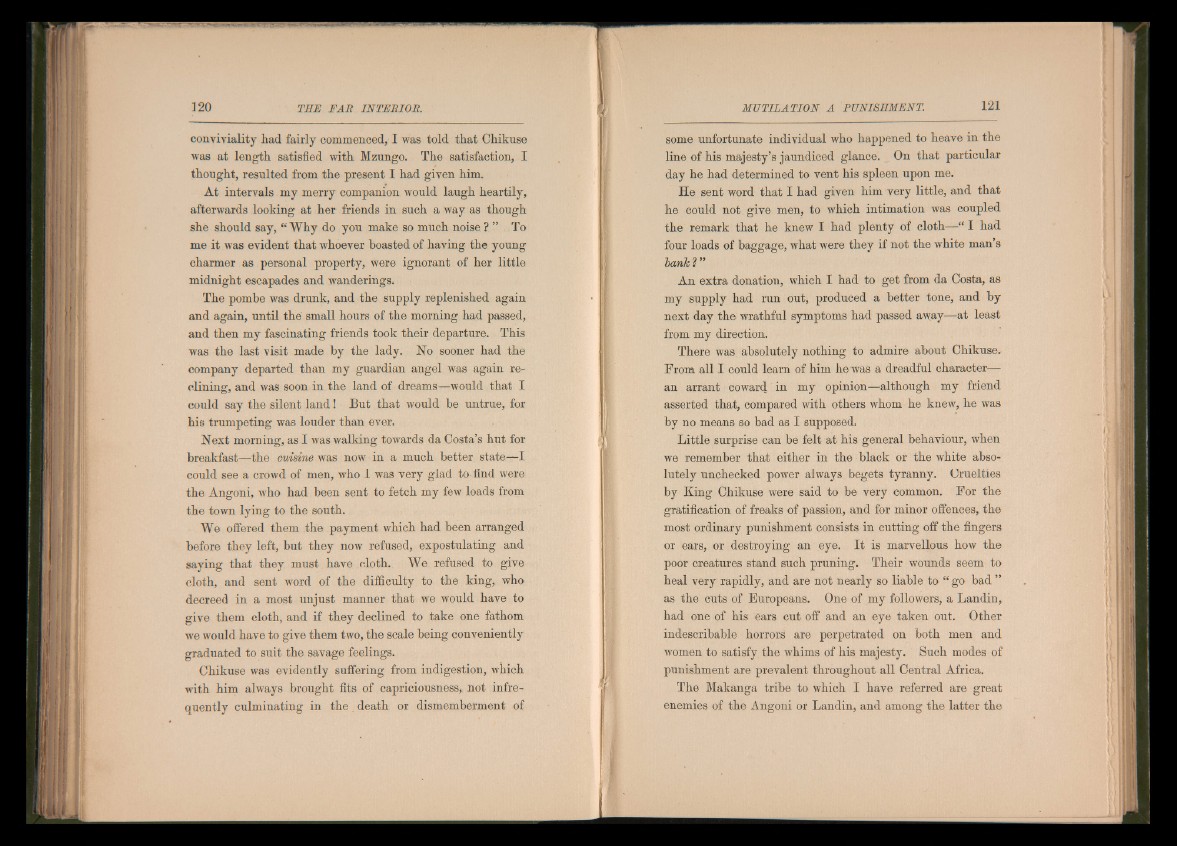
conviviality had fairly commenced, I was told that Chikuse
was at length satisfied with Mzungo. The satisfaction, I
thought, resulted from the present I had given him.
At intervals my merry companion would laugh heartily,
afterwards looking at her friends in such a way as though
she should say, “Why do you make so much noise ? ” To
me it was evident that whoever boasted of having the young
charmer as personal property, were ignorant of her little
midnight escapades and wanderings.
The pombe was drunk, and the supply replenished again
and again, until the small hours of the morning had passed,
and then my fascinating friends took their departure. This
was the last visit made by the lady. No sooner had the
company departed than my guardian angel was again reclining,
and was soon in the land of dreams—would that I
could say the silent land ! But that would be untrue, for
his trumpeting was louder than ever.
Next morning, as I was walking towards da Costa’s hut for
breakfast—the cuisine was now in a much better state—I
could see a crowd of men, who I was very glad to find were
the Angoni, who had been sent to fetch my few loads from
the town lying to the south.
We offered them the payment which had been arranged
before they left, but they now refused, expostulating and
saying that they must have cloth. We refused to give
cloth, and sent word of the difficulty to the king, who
decreed in a most unjust manner that we would have to
give them cloth, and if they declined to take one fathom
we would have to give them two, the scale being conveniently
graduated to suit the savage feelings.
Chikuse was evidently suffering from indigestion, which
with him always brought fits of capriciousness, not infrequently
culminating in th e . death or dismemberment of
some unfortunate individual who happened to heave in the
line of his majesty’s jaundiced glance. On that particular
day he had determined to vent his spleen upon me.
He sent word that I had given him very little, and that
he could not give men, to which intimation was coupled
the remark that he knew I had plenty of cloth—“ I had
four loads of baggage, what were they if not the white man’s
bank ? ”
An extra donation, which I had to get from da Costa, as
my supply had run out, produced a better tone, and by
next day the wrathful symptoms had passed a^vay—at least
from my direction.
There was absolutely nothing to admire about Chikuse.
From all I could learn of him he was a dreadful character—
an arrant coward in my opinion—although my friend
asserted that, compared with others whom he knew, he was
by no means so bad as I supposed.
Little surprise can be felt at his general behaviour, when
we remember that either in the black or the white absolutely
unchecked power always begets tyranny. Cruelties
by King Chikuse were said to be very common. For the
gratification of freaks of passion, and for minor offences, the
most ordinary punishment consists in cutting off the fingers
or ears, or destroying an eye. I t is marvellous how the
poor creatures stand such pruning. Their wounds seem to
heal very rapidly, and are not nearly so liable to “ go bad ”
as the cuts of Europeans. One of my followers, a Landin,
had one of his ears cut off and an eye taken out. Other
indescribable horrors are perpetrated on both men and
women to satisfy the whims of his majesty. Such modes of
punishment are prevalent throughout all Central Africa.
The Makanga tribe to which I have referred are great
enemies of the Angoni or Landin, and among the latter the